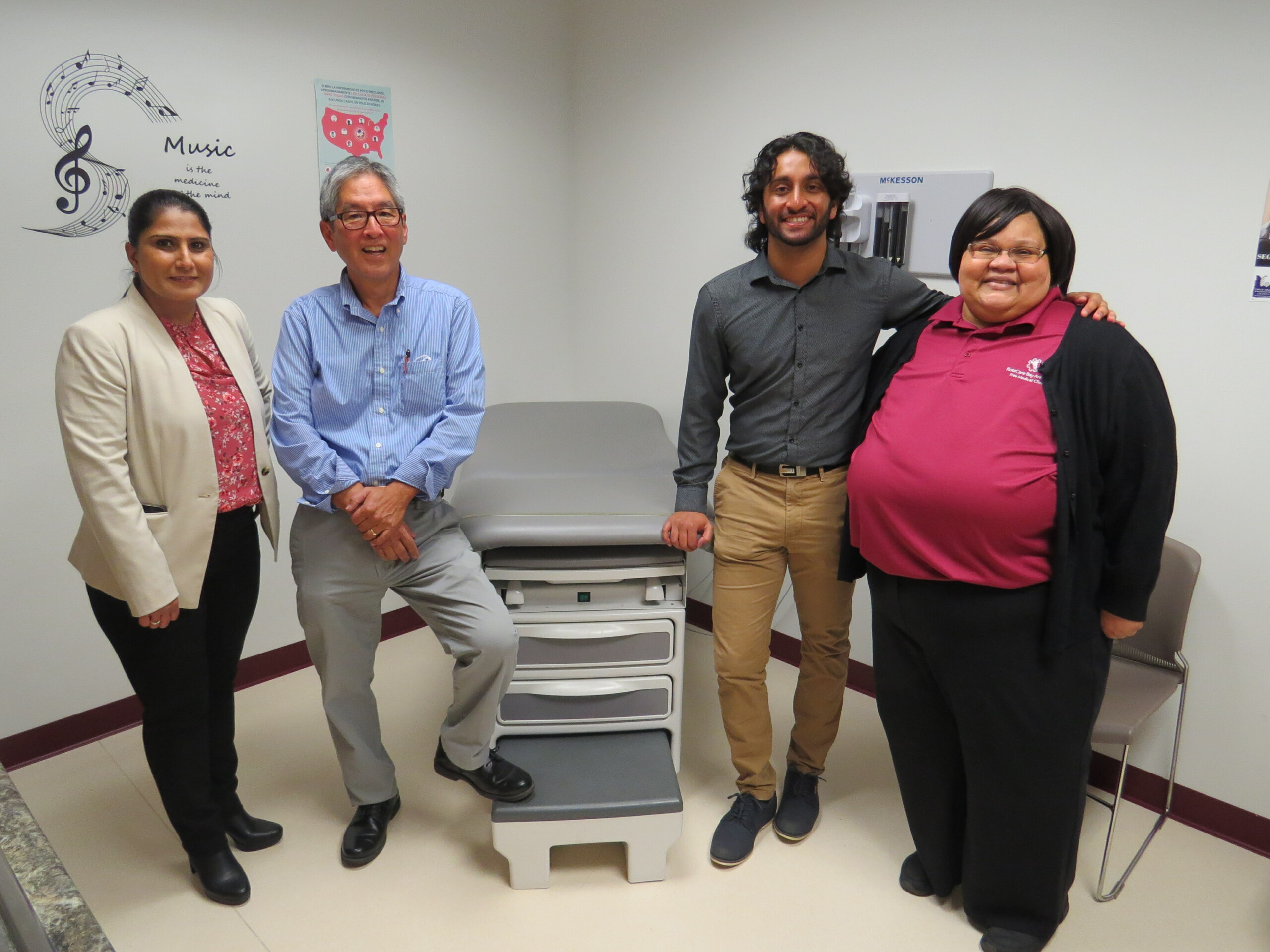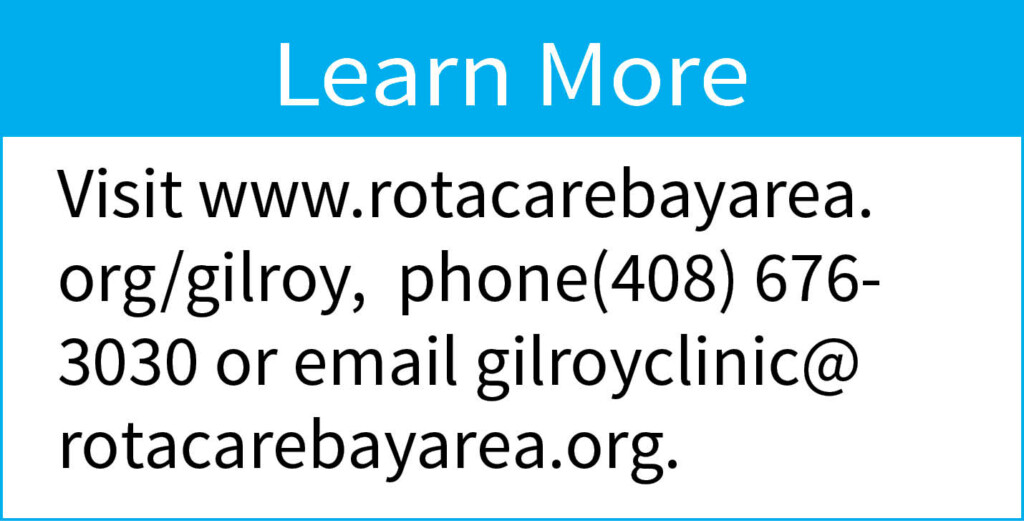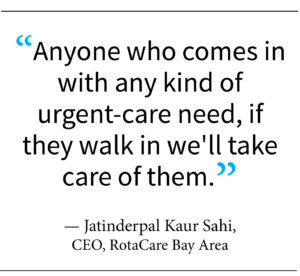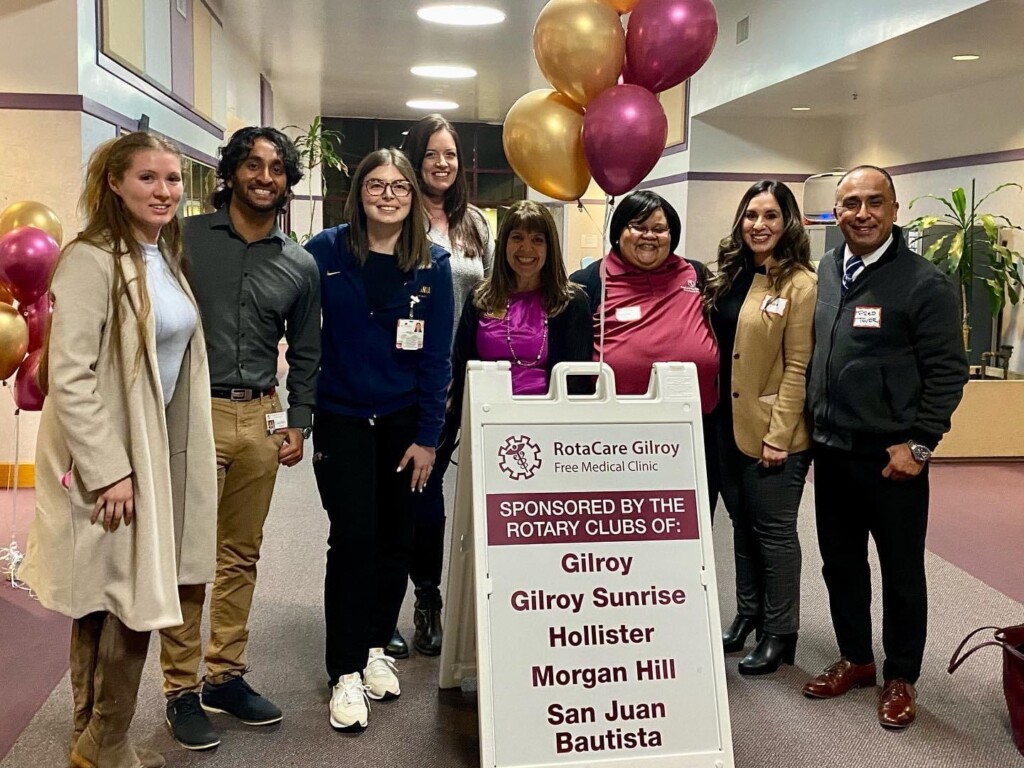Main story: RotaCare’s Gilroy site provides health care to the uninsured
Nonprofit opened a new free clinic at a former GUSD campus on Wren Avenue
![]()

From left: Jatinderpal Kaur Sahi (CEO, RotaCare Bay Area), Dr. Michael Matsumoto (medical director, RotaCare Gilroy), Sachin Narayan (clinic intern, RotaCare San Jose and Gilroy), and Felicia Barkley (clinic manager, RotaCare San Jose and Gilroy)
By Calvin Nuttall
![]()
 The UCLA Center for Health Policy Research estimates 11 percent of Californians remain uninsured. The RotaCare Bay Area nonprofit organization aims to provide health care for those unable to afford insurance.
The UCLA Center for Health Policy Research estimates 11 percent of Californians remain uninsured. The RotaCare Bay Area nonprofit organization aims to provide health care for those unable to afford insurance.
Thanks to the RotaCare Gilroy health clinic, uninsured adults in the South Valley can receive access to free health services. Originally located at South Valley Middle School on Murray Avenue, the clinic closed during the pandemic due to a decline in patients. It reopened in March 2022 at Gilroy Unified School District’s former Antonio Del Buono Elementary School site at 9300 Wren Ave.
“Anyone who walks into our clinic, the only question we ask them is, ‘Do you have insurance?’” said RotaCare CEO Jatinderpal Kaur Sahi. “We don’t ask for anything else. If they say no, then we provide the service for them at no cost to the patient.”
Rotary, a nonprofit service organization, sponsors 10 clinics across the Bay Area. They are located in Concord, Daly City, Gilroy, Half Moon Bay, Monterey, Pittsburg, Richmond, San Jose, San Rafael, and Santa Cruz. The clinics receive 20 percent of funding from local Rotary clubs. The rest comes from grants and individual donations.
“We want to thank the local Rotary clubs that provided the funding to help us reopen,” Sahi said. “We saw a decline in patients after we moved, so we want the public to know we’re here.”
 “Anyone who comes in with any kind of urgent-care need, if they walk in we’ll take care of them,” Sahi said. “We see a lot of patients who don’t get primary care, especially if they are undocumented. They sometimes end up in the ER when it’s really severe, and we don’t want that to happen.”
“Anyone who comes in with any kind of urgent-care need, if they walk in we’ll take care of them,” Sahi said. “We see a lot of patients who don’t get primary care, especially if they are undocumented. They sometimes end up in the ER when it’s really severe, and we don’t want that to happen.”
The goal of RotaCare is to prevent those emergency room visits. If a patient comes to RotaCare with an issue needing a hospital visit, such as a broken bone, the clinic will refer them to the hospital and even call the ambulance for them if necessary.
“A lot of our patients come to us through word-of-mouth because they have trust in us,” Sahi said. “We’re not looking to be their medical home. We’re looking to be that gateway into health care so that we can provide them with resources and let them know what else is possible. So, if someone comes in who qualifies for Medi-Cal, we want to be able to provide them with that resource and connect them.”
RotaCare started in San Jose in 1989. Dr. Mark Campbell, a Rotarian, saw a need for additional health services and realized he and the other club members were in a position to do something about it.
 “He went out into the park, saw there were people who needed help, took out his little bag, and started providing services,” Sahi said. “Our first clinic was located out of Agnews State Hospital. Hence our name, ‘RotaCare.’ We were started by Rotarians and are supported by Rotary clubs.”
“He went out into the park, saw there were people who needed help, took out his little bag, and started providing services,” Sahi said. “Our first clinic was located out of Agnews State Hospital. Hence our name, ‘RotaCare.’ We were started by Rotarians and are supported by Rotary clubs.”
Physician Michael Matsumoto, the medical director at the Gilroy clinic, has volunteered with RotaCare for more than 25 years.
“Ever since I was an adolescent, I had a heart to give,” he said. “I would always volunteer somewhere. I started working at Kaiser in Gilroy in 1987, and three or four years after that I heard about RotaCare. I wanted to volunteer while I was working as a regular physician. That’s where my heart is, to serve.”
The services offered by the clinic are underutilized, Matsumoto said. After reopening last spring, the staff has seen the number of patients drop far below their current capacity. In order to get the word out, the clinic hosted an open house in January and invited the public to tour the facilities. Members of local Rotary clubs supporting the clinic attended and met with the clinic’s staff and volunteers.
“Ever since COVID-19, our number of patients has really dropped off,” Matsumoto said. “We know there are patients who are still falling through the cracks. Obamacare really helped, and the expansion of Medicare helped, but there are still patients who are not getting any kind of care. If they get really sick, they show up in the ER.”
 Sachin Narayan serves as the clinic operations intern at the Gilroy clinic and also volunteers at the San Jose location. Interns like him form the operational backbone of the organization, he said. They train volunteers in the medical records system, help with day-to-day clinic operations, and manage patients to make sure they see the appropriate doctors.
Sachin Narayan serves as the clinic operations intern at the Gilroy clinic and also volunteers at the San Jose location. Interns like him form the operational backbone of the organization, he said. They train volunteers in the medical records system, help with day-to-day clinic operations, and manage patients to make sure they see the appropriate doctors.
“I’ve always had an appreciation for what I call ‘systematized service,’” he said. “I grew up volunteering, and I started to fall in love with the concept of how to volunteer at scale, working to make systems that can help people who are under-resourced.”
The staff at the RotaCare Gilroy clinic is dedicated to providing health care to people who financially cannot afford insurance such as the unhoused population, he said. They’re committed in 2023 to broadening their outreach to make sure everyone who needs their service knows that they are available.
“We want to tell the local community of Gilroy and the broader Bay Area that RotaCare is back,” Narayan said. “I know COVID-19 has been tough on a lot of families, not only from a health and economic perspective. We want to be a resource, and we’re available. For any uninsured adult who needs care in the Bay Area, we will see you.”
The RotaCare Gilroy clinic is open for in-person visits every first and third Tuesday of the month. It’s also open through the clinic’s tele-health system every second and fourth Tuesday of the month. Clinic hours are 5:30 to 9 p.m. Visits require an appointment, which can be made online or by phone as late as the same day. Translation services are available for those who need them.

Calvin Nuttall is a freelance writer and Morgan Hill resident.

